
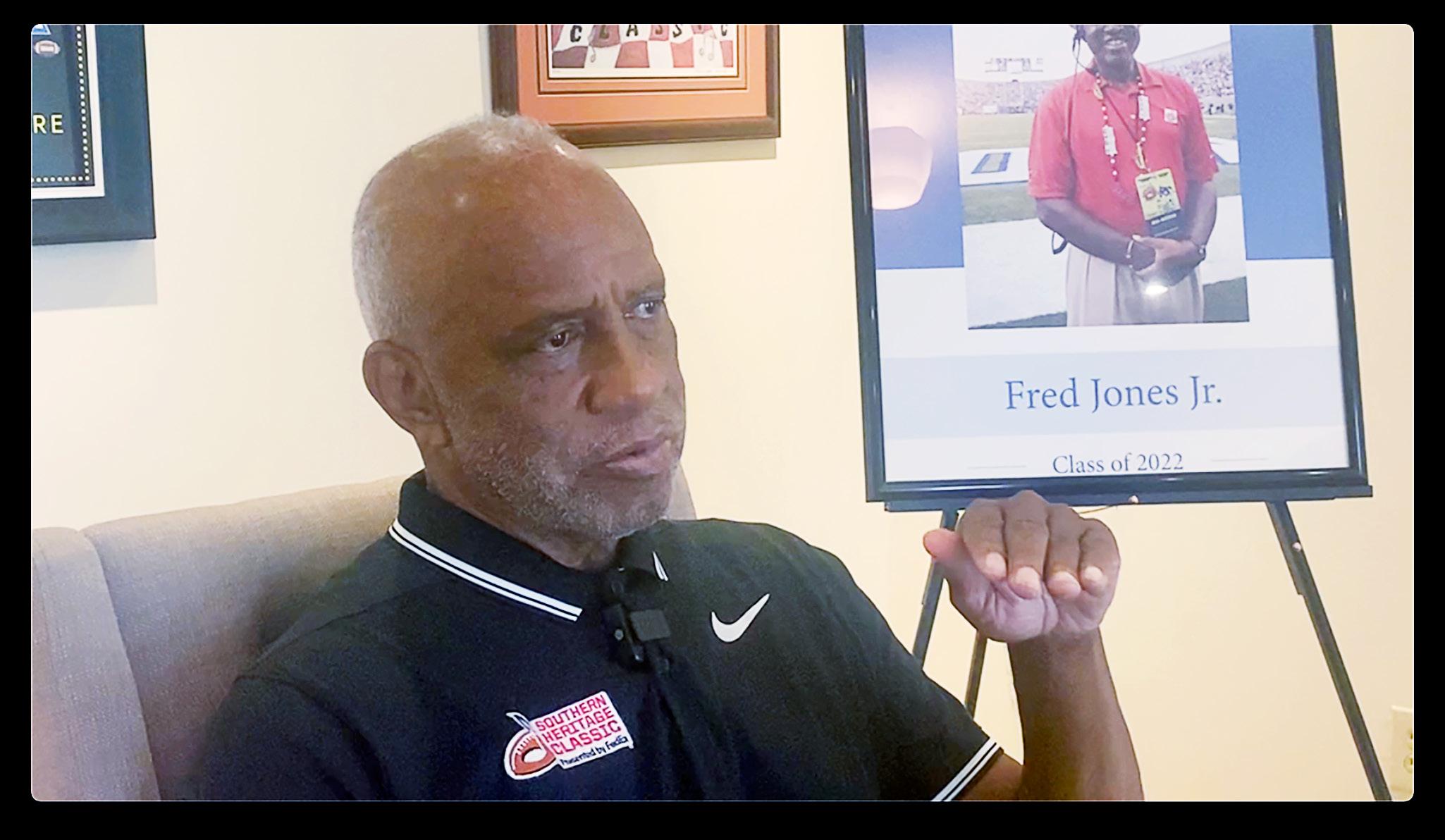









By James Coleman TSD Contributing Writer
by The Tri-State Defender
POSTMASTER: Send address changes to The Tri-State Defender, 1509 Madison Ave., Memphis, TN, 38104.
GENERAL INFORMATION: Inquiries may be submitted in writing or by calling (901) 523-1818 or by email.
TELEPHONE: (901) 523-1818.
The Tri-State Defender (USPS 780-220) is published weekly. The Tri-State Defender 1509 Madison Ave. Memphis, TN, 38104. Second-class postage paid in Memphis, TN. The Tri-State Defender is a member of The National Newspaper Publishers Association and the Tennessee Press Association.
without the
permission of the Publisher. (901) 523-1818 | 1509 Madison Ave, Memphis, TN 38104
A decision by the Shelby County Commission to delay appointments to the defunct Shelby County Ethics Commission has effectively ended the attempt to revive the oversight board. Shelby County commissioners voted to delay the long-pending appointments for another six months during their meeting Monday, Sept. 8. Mayor Lee Harris later informed the media that he will no longer pursue appointments to the shuttered commission.
Shelby County has been without a functioning ethics board since 2021. County commissioners had been considering the nominations of County Register Willie Brooks, former Judge Yollander Hardaway and former State Rep. Duane Thompson. Prior to the discussion, Brooks withdrew his name from consideration.
“After careful thought, reflection and ongoing issues with my father, I believe it would be in my best interest to step aside at this time,” Brooks wrote. “I sincerely appreciate the confidence and support extended by the nomination from Mayor Harris.”
The former commissioner’s nomination had been separated from the other nominees during a Sept. 3 committee meeting. Both resolutions were sponsored by Commissioner Henri Brooks.
Harris’ renewed push for the ethics board followed the arrest of Commissioner Edmund Ford Jr., who was indicted by federal authorities Feb. 28 for alleged kickbacks and money laundering. Prosecutors say Ford awarded grant money to local nonprofits in exchange for purchasing laptops from a business he owns.
Ford has denied all charges and has accused Harris of reviving the ethics board as part of a political vendetta.
The embattled commissioner also alleged ethics violations by Harris, fellow
commissioners and county employees. He claimed the mayor pursued side deals with members in exchange for support to remove him from office.
Commissioner Britney Thornton appeared to confirm Ford’s claim. She said that while advocating for $2.7 million in funding for her district, she was “explicitly asked by the mayor to support voting against Commissioner Ford.”
“It felt wildly inappropriate for the mayor to even try to ask me to make a concession with anything that was unrelated to anything District 10-related,” Thornton said.
When asked by Commissioner Amber Mills, County Attorney Megan Smith could not verify whether Harris’ alleged
offer amounted to a “quid pro quo.” Ford also requested that the county human resources department investigate elected officials and county employees for allegedly creating a hostile work environment, conflicts of interest, and retaliation against him.
Those named in his request include Avant, Henri Brooks, Willie Brooks, Harris and County Attorney Jerri Green.
Throughout the stalled appointment process, Ford repeatedly criticized Harris and fellow commissioners, claiming hypocrisy and referencing alleged documents to support his claims.
Avant reminded members what the resolution was about and cautioned against “conflating” personal conflicts with commission business.

By Collin Binkley Associated Press
WASHINGTON — The Trump administration is redirecting nearly $500 million in federal funding toward historically Black colleges and tribal colleges, a one-time investment covered primarily by cuts to other colleges serving large numbers of minority students.
The Education Department announced the funding boost days after cutting $350 million from other grants, mostly from programs reserved for colleges that have large numbers of Hispanic students. Agency leaders said those grants were unconstitutional because they’re available only to colleges with certain minority enrollment thresholds.
Education Secretary Linda McMahon said the changes will redirect money away from “ineffective and discriminatory programs toward those which support student success.”
“The Department has carefully scrutinized our federal grants, ensuring that taxpayers are not funding racially discriminatory programs but those programs which promote merit and excellence in education,” McMahon said in a statement.
The department is also redirecting about $60 million toward funding for charter schools and $137 million toward American history and civics grants. President Donald Trump in January issued an executive action ordering the agency to repurpose federal money toward charter schools and other school choice initiatives.
It amounts to a one-time federal Title III funding boost of 48% increase for HBCUs, and it more than doubles

funding for tribal colleges and universities, the department said.
The United Negro College Fund and the Thurgood Marshall College Fund both issued statements Monday applauding the announcement.
“This additional funding is nothing short of a godsend for HBCUs,” said Lodriguez V. Murray, UNCF’s senior vice president of public policy and government affairs.
“When President Trump released his executive order for HBCUs during his first 100 days of this term, many said that it did not produce funding,” Murray elaborated. “That is no longer the case. His order called for strengthening HBCUs by adding fiscal stability. These funds will begin that process.
“However, no one should be confused: HBCUs are currently and have been underfunded since their inception. While we are grateful for these funds, we are still under-resourced.”
“This funding mechanism, called ‘Title III,’ is considered the most essential out of all federal grants for HBCUs,” continued Murray.
The Thurgood Marshall College Fund said in a statement that Monday’s announcement builds upon Trump’s track record of support of HBCUs.
“During his first term in office, President Trump oversaw a record amount of federal resources being delivered to HBCUs, in addition to signing the FUTURE Act, which extended mandatory funding and the HBCU PARTNERS Act, which mandated federal agencies meaningfully engage with our universities,” said TMCF President and CEO Dr. Harry L. Williams.
The Education Department is flexing its power to repurpose discretion-

LeMoyne-Owen College is among the historically Black colleges set to receive a share of nearly $500 million in redirected federal funding under a one-time initiative by the Trump administration. The Education Department said the funds were reallocated from other minority-serving programs deemed unconstitutional, including grants primarily supporting colleges with large Hispanic student populations. (Gary S. Whitlow/ GSW Enterprises/The New Tri-State Defender)
ary funding to match the president’s priorities — made possible through a stopgap funding bill passed by Congress this year that gives the executive branch more authority over spending decisions.
Trump has long called himself a champion of HBCUs. During his first term, Congress added $250 million a year for HBCUs. This year Trump signed an executive action that pledges an annual White House summit, an advisory board and other support for HBCUs.
The Education Department said the money comes from programs found to be “not in the best interest of students and families.” It previously said the other minority-serving grants would be redirected to programs that do not rely on racial quotas.
A person familiar with the decision said money is also being directed away from programs that support gifted and talented programs, magnet schools, international education and teacher training. Most of those programs would be zeroed out in Trump’s 2026 budget request, said the person, who was not authorized to discuss the decision and spoke on the condition of anonymity.
Last week’s cuts to the Hispanic Serving Institution program reversed decades of precedent. Congress created the program in 1998 after finding that Latino students were going to college and graduating at far lower rates
than white students. The department also cut several smaller programs for colleges serving certain percentages of Asian American, Black or Native American students.
The cuts drew swift blowback from Democrats, who said those programs have long had bipartisan support and fueled social mobility for working-class Americans.
A July memo from the Justice Department argues that the Hispanic Serving Institution grants are unconstitutional because they’re open only to colleges where a quarter of undergraduates or more are Hispanic. The department declined to defend the program in a suit brought by the state of Tennessee and Students for Fair Admissions, an anti-affirmative action group.
The lawsuit asks a federal judge to halt the grants. Tennessee argued all of its public universities serve Hispanic students, but none meet the “arbitrary ethnic threshold” to be eligible for the funding. Those schools miss out on tens of millions of dollars because of discriminatory requirements, the suit said.
— The Associated Press’ education coverage receives financial support from multiple private foundations. AP is solely responsible for all content. Find AP’s standards for working with philanthropies, a list of supporters and funded coverage areas at AP.org.

Flanked by civic leaders, administration seeks ways to generate wins from deployment
By Lee Eric Smith TSD Contributing Writer
Is Memphis Mayor Paul Young “happy” about federal troops coming to a city that didn’t ask for them, as President Donald Trump claimed in a recent interview?
“That would be an overstatement,” Young told reporters with a wry smile Friday. “I am focused on resources — FBI, DEA, ATF — those are the things that I believe will truly help us support law enforcement and reduce violent crime.”
Flanked by a broad coalition of business, political and community leaders at City Hall, Young sought to project unity in a moment of uncertainty. His message: If Memphis has no control over whether federal troops arrive, city leaders must find a way to ensure their presence strengthens the community.
Young said he hopes to use the days and weeks ahead to coordinate with state and federal officials on where the incoming resources go and how they are used.
“The mayor doesn’t have the authority to stop them,” Young said. “But my goal is to make sure that as they come, I have an opportunity to work with them to strategize on how they engage in this community. We want to make sure that whatever resources are provided, they reinforce the strategies that we know are working in Memphis — not distract from them.
“That means aligning their presence with the work our law enforcement is already doing, not creating confusion or duplication. If they’re here, they need to be part of the solution we’ve been building,” Young said He added that he has spoken with other mayors who have faced similar deployments, including Washington, D.C., Mayor Muriel Bowser, and he hopes to build the same kind of working relationship.
State Rep. Antonio Parkinson, a Marine veteran, struck a similar note, urging Memphians not to panic about soldiers in the streets.
“There’s not going to be tanks rolling in the streets of Memphis. The roads couldn’t even support tanks,” he said.
Instead, Parkinson suggested the deployment could be reframed as an opportunity.
“They’re not all infantry. Some are military police, some are in accounting, some in medicine,” he said. “Let’s get an inventory of who’s coming, what jobs they do, and then backfill where we’re short. That frees up our own resources to do more in our community with the people we already have.”
Parkinson added that troops may not arrive for “25 or 30 days,” leaving time for dialogue with Gov. Bill Lee and others.
“The president wants a picture — ‘we’re sending troops into Memphis’ — but on the ground, you might see
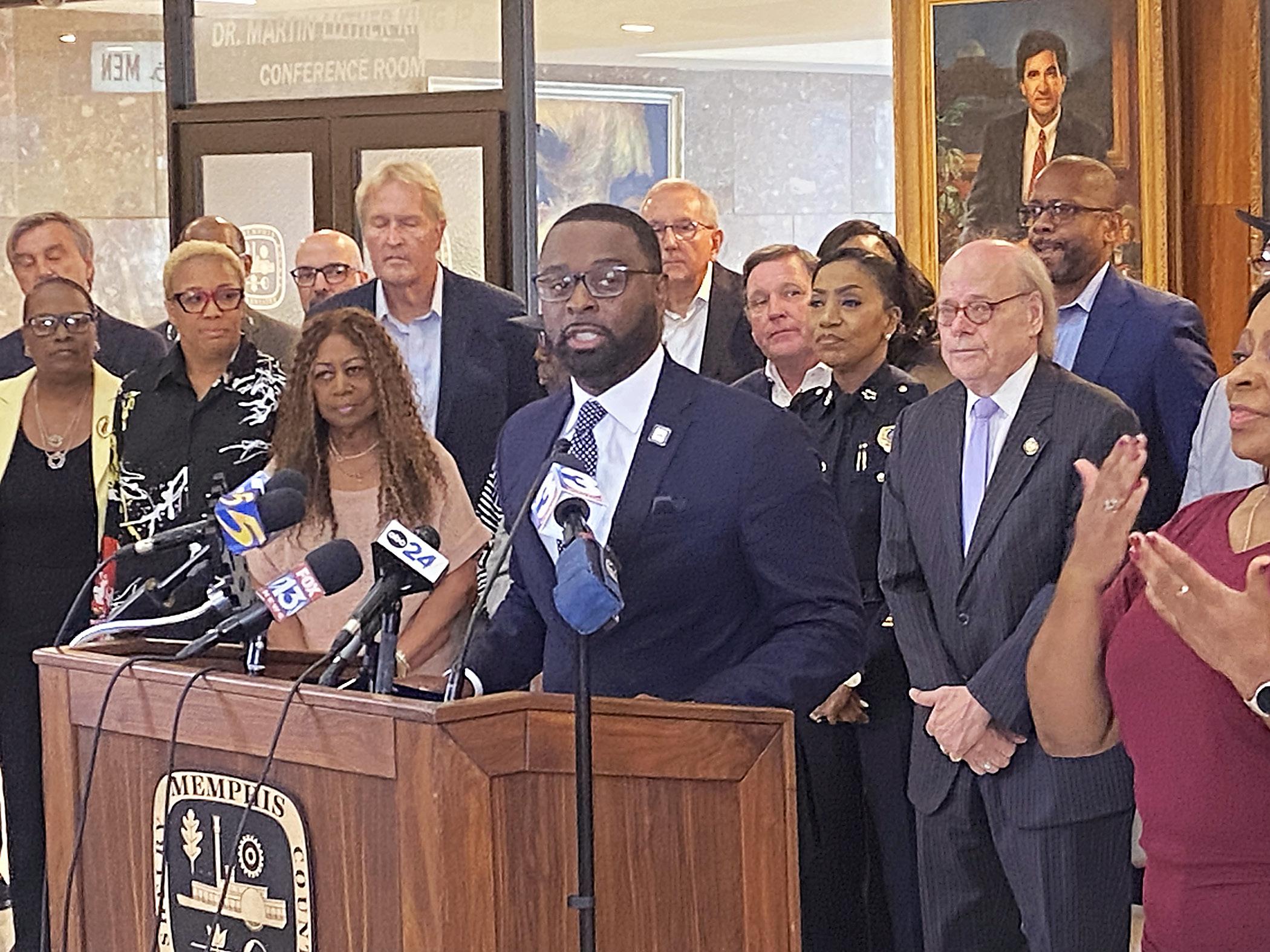
people picking up trash,” he said. “I just don’t think it warrants the hysteria some are trying to create.”
Statehouse support vs. local pushback
Tennessee Gov. Bill Lee welcomed the federal deployment.
“I’m grateful for the President’s unwavering support and commitment to providing every resource necessary to serve Memphians,” Lee said in a statement. “Memphis remains on a path to greatness, and we are not going to let anything hold them back.”
That stance stood in sharp contrast to Shelby County Mayor Lee Harris, who denounced the move as “anti-democratic” and potentially unlawful.
“The President’s announcement that troops will occupy Tennessee communities is disappointing, anti-democratic, and violates American norms and possibly U.S. laws,” Harris said. “In the short term, the President’s incursion will likely cause confusion and fear in many of our communities, particularly the most vulnerable ones. In the long
term, the mark of Tennessee communities being occupied by federal forces will hurt our state’s reputation for generations.
“Let’s be clear: the President sending troops to Tennessee will interfere and have a chilling effect on Tennesseans’ ability to exercise critical freedoms, such as the freedom to protest and the liberty to travel.” Harris added. “We will do everything in our power to prevent this incursion into Tennessee and to protect the rights, safety and dignity of every resident in our communities.”
President Trump has painted a dire picture, describing Memphis as “deeply troubled” and insisting the National Guard is needed to “fix that, just like we did Washington.” He also claimed that both the mayor and governor were “happy” with the plan.
But city leaders dispute both the framing and the statistics.
Young pointed to measurable progress in crime reduction across multiple
categories. In 2024, Memphis saw a 13% overall reduction in crime, a 19% drop in violent crime, a 29% decline in murders, and a 37% fall in carjackings. He said 2025 is on pace to meet or exceed those reductions.
“We’re seeing double-digit percentage reductions in crime across the board,” Young said. “I believe what we should do is double down on the strategies that we know work.”
Memphis Police Chief C.J. Davis reinforced that those trends are not abstract.
“Over the last 60 days, we had a federal operation with FBI, DEA, ATF focused on the worst of the worst in our community. We were very successful in that,” she said. “We need more of that kind of resource — investigative power, analytical power, software, social media analysis. Those tools help us keep crime moving in the right direction.” Davis stressed that MPD remains in charge. “We want to make sure our community members understand that the Memphis Police Department is the primary public safety agency in the city of Memphis,” she said. “Ideally, we’ll have a memorandum of understanding so we’re all on the same page about who’s doing what.”

U.S. Rep. Steve Cohen was more blunt in his assessment of the deployment, calling it politically motivated and racially charged.
“It’s a racist move,” Cohen told the TSD. “This is a Black city, it’s a Black mayor, and it’s a white president who likes to cater to white people who like to send powerful troops or law enforcement officers after Black people. And it’s been a curse of this country for decades, centuries.”
Cohen said the symbolism was more telling than the substance.
“Trump has made this into something that it isn’t,” he added. “There was crime in Washington, and there’s crime in Memphis and Nashville and Detroit and New Orleans and St. Louis. But he’s not going to solve it by sending federal troops in for a couple of months. That’s not going to change it.”
Mulroy: ‘Performative’ deployments
Shelby County District Attorney Steve Mulroy added his concerns, arguing that the National Guard is the wrong tool for the job.
“I hope the governor will tell the Trump administration that a better
strategy would be sending more FBI and other federal law enforcement agents — people with actual training in civilian law enforcement, unlike military troops,” Mulroy said.
“These high-profile, short-term military deployments risk seeming performative and leaving no lasting impact.”
Even with local, state and federal leaders in communication, major questions remain.
“When will they come? How many people are going to come? How long will they be here? What are they going to wear? Where are they going to be geographically in the city? What assignments will they have?” Young asked.
Davis echoed the need for clarity.
“If there is an opportunity for more resources to be in our city, what we have to do is make an assessment as to what their role would be,” she said. “We will be communicating very closely with the National Guard to talk about the plan, the numbers, what communities will be affected, and how our officers continue to do the work they have to do every day without this being
a distraction.”
While the National Guard may soon be visible on Memphis streets, Young closed the press conference by insisting the real work lies in addressing root causes of crime.
“My ultimate goal is to make sure we get a long-term partnership and commitment with the state, the federal government and community partners — to invest in outreach and rehabilitation, in trauma services, in housing and small businesses, in building a workforce and pipeline for the jobs of the future,” he said.
“Most importantly, we must remain committed to raising the level of hope in the hearts of the people that live in this community. Hope is about a clear image of the future and a true belief that image can be achieved. For far too many, that hope has been gone. My goal as mayor is to make sure everything we do is centered around elevating that hope.”
TSD Contributing Writer Dalisia Ballinger contributed to this report, which was also supplemented by reporting from The Associated Press.


By Will Weissert Associated Press
WASHINGTON — President Donald Trump signed an order Monday sending the National Guard into Memphis to combat crime, offering another major test of the limits of presidential power by using military force in American cities.
With Republican Tennessee Gov. Bill Lee visiting the Oval Office, Trump said troops would be deployed and join a special task force in the city composed of officials from various federal agencies, including the FBI, Drug Enforcement Administration, Immigration and Customs Enforcement and the U.S. Marshall’s service.
He said the goal would be to stamp out crime in a way that he says sending in the National Guard and federalizing the local police force has done in Washington.
“This task force will be a replica of our extraordinarily successful efforts here,” Trump said of D.C. “And, you’ll see it’s a lot of the same thing.”
The presidential memorandum Trump signed did not include details on when troops would be deployed or exactly what his promised surge in law enforcement efforts would look like. Trump said that the FBI had already stepped up its recent activities in Memphis, which is majority Black and Tennessee’s second-largest city, and had helped reduce crime, but, “We’re sending in the big force now.”
Shortly before Trump’s announcement, the White House posted on social media that the Memphis total crime rate was higher than the national average and suggested that the rate had increased since last year, bucking national trends.
That’s despite Memphis police recently reporting decreases across every

major crime category in the first eight months of 2025 compared to the same period in previous years. Overall crime hit a 25-year low, while murder hit a six-year low, police said.
Still, Memphis has dealt with stubborn gun violence problems for years. In 2023, the city set a record with more than 390 homicides.
Tennessee’s governor embraced the troop deployment as part of a broader law enforcement surge in Memphis, with Lee saying Monday that he was “tired of crime holding the great city of Memphis back.”
Trump’s action followed his first announcing that he’d soon be deploying the National Guard to Memphis on Friday — drawing immediate pushback from its Democratic leader.
“I did not ask for the National Guard,
and I don’t think it’s the way to drive down crime,” Mayor Paul Young told a news conference Friday while acknowledging the city remained high on too many “bad lists.”
Speculation had centered on Chicago as Trump’s next city to send in the National Guard and other federal authorities. But the administration has faced fierce resistance from Democratic Illinois J.B. Pritzker and other local authorities.
Trump nonetheless insisted Monday, “We’re going to be doing Chicago probably next” while also suggesting that authorities would wait and not act immediately there.
Speaking about a skyscraper bearing his name in the nation’s third largest city, Trump said he “knew all about” Chicago and had “a great beautiful building. I’m so proud of it.”
“But you get less proud when you see all the crime,” he added.
Pressed on whether he might send troops into Chicago without support from state and local authorities, the president insisted, “It’s not going to matter to us at all.”
“We hope we have the governor’s help,” he said. “But, if we don’t, we’re doing it without him.”
Trump has also previously said he’d be willing to send troops to New Orleans — another Republican-leaning state in a Democrat-run city. He mentioned New Orleans again on Monday, but also singled out Baltimore and even St. Louis as locales that could be in line for troop deployments eventually — though he provided no details.
“We want to save these places,” Trump said.

By James Coleman TSD Contributing Writer
Following weeks of community uproar, the North Memphis neighborhood of New Chicago has been removed from the short list of potential sites for a new Shelby County Jail.
Shelby County commissioners voted 8-3-1 on Monday, Sept. 8, approving Commissioner Henri Brooks’ amendment to remove the 70-acre former Firestone tire plant from consideration.
“I brought this resolution because I heard from the constituents. I heard their opposition. I attended their meetings,” Brooks said.
However, questions remain about the legality of excluding the site — specifically, whether it might infringe on the rights of the privately owned entity SMPO Properties Inc., the Memphis-based real estate firm leading development of the jail project. An opinion from the county’s legal department is expected.
Before the vote, Brooks shared feedback from the Tennessee Department of Environment and Conservation. While some remediation of contaminants has occurred at the Firestone site, TDEC reviews indicated more work would be required to make the land safe and that placing a prison on contaminated property could be illegal.
In response, a representative for SMPO Properties pushed back, stating that extensive remediation had already been completed before the company presented its plan for a public-private partnership to the commission on Aug. 6.
“In 2003, Bridgestone offered the property to the Memphis Junior Golf Association, completed all required remediation and received TDEC approval to use this as a driving range and
a nine-hole course for children,” Deidre Malone, president and CEO of The Carter Malone Group, said.
Malone’s firm was hired by the property owner to counter public negative perceptions of the New Chicago proposal.
Proponents argue that relocating the jail to New Chicago would be an economic boon: Moving the county’s entire criminal and civil justice systems could attract law firms and supporting businesses.
The New Chicago site had topped the County Technical Assistance Service (CTAS) list of potential locations; the other options presented in August were Downtown Memphis and Shelby Farms.
But Malone’s comments drew strong negative reactions, including loud boos, from many in the audience who opposed New Chicago being considered as a site for the new jail.
Community members have raised multiple objections over the past month and again at the meeting from environmental health concerns to opposition to having a jail anchoring their neighborhood. Many criticized the process, saying early discussions focused almost exclusively on New Chicago — notably excluding serious consideration of other sites — creating the impression of a foregone conclusion.
North Memphis, historically underserved, grapples with poverty, crime, addiction and mental health issues. Critics fear a jail will reinforce negative stereotypes.
We do not need a new jail in New Chicago. What we need is new opportunities, new investments, new commitments to the future of the people who live there. It is wrong, and it is immoral for someone to propose putting a jail in a historically Black community
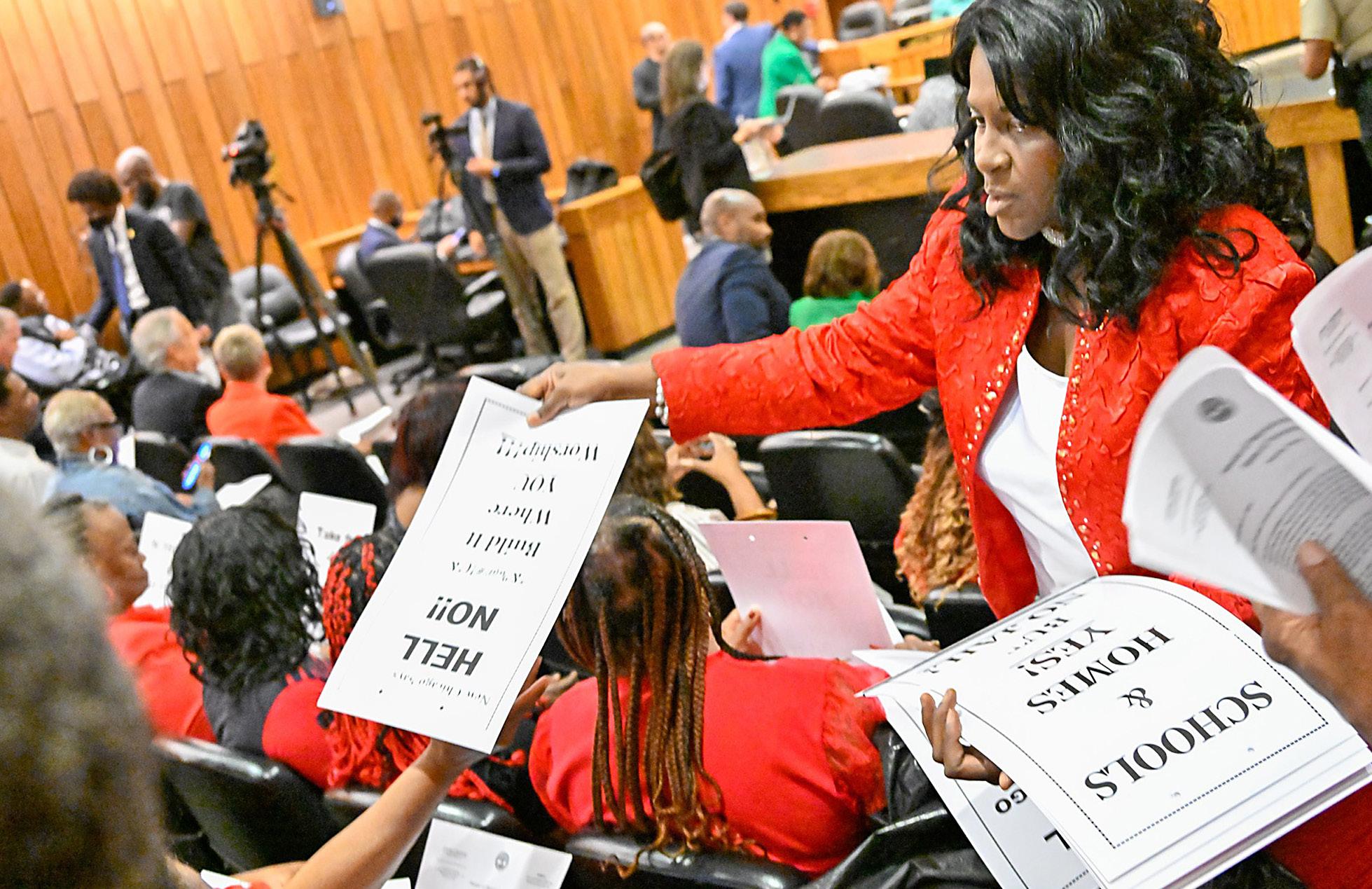
and to ask this county commission and taxpayers to fund it for their own private gain,” said state Rep. Justin Pearson.
(Editor’s Note: Separate from Malone’s role as CMG leader, she is a part owner of The Tri-State Defender and vice president of its board of directors. Dayto-day news decisions at TSD are made by editor Stephanie R. Jones and TSD Board President Calvin Anderson.)
No one disputes the need for a new facility. Built in 1983, the Walter L. Bailey Criminal Justice Center is overcrowded, rapidly decaying, and was patched with about $11 million in emergency repairs — including new jail doors and security systems — yet remains unsafe. There have been seven inmate deaths this year at the facility.
“We can’t continue to kick this can down the road when it comes to a jail. It’s inhumane,” said Commissioner Mickell Lowery. “What we all know about being incarcerated is (that) one day people are going to get out. If we are treating people inhumanely now when they are incarcerated, what do you think they are going to be when they get out?”
Chairwoman Shante Avant announced the formation of an ad hoc committee to research and make
recommendations on how the request-for-proposal (RFP) process should be conducted for selecting a site and developer for the new jail. Commissioner Mickell Lowery will chair the committee with Commission Chair Pro Tempore David Bradford Jr. as vice chair. The group will include citizens and subject-matter experts, who have been notified of their participation.
“The ad hoc committee will not be making a determination of where the jail will be located. It’s just for the RFP process,” Lowery said. “Quite frankly, the 13 of us shouldn’t be making this decision in a vacuum. This is a generational decision.”
The county will issue a request for proposals to fund a master plan for a new jail, which would centralize criminal and civil justice services.
Downtown and Shelby Farms, which already house law enforcement operations, are likely to remain under consideration. The Downtown site could potentially expand eastward from the existing 201 Poplar Ave. facility toward Danny Thomas Boulevard, while the Shelby Farms option involves expanding the current penal farm located there.
At the end of her comments, Malone asked commissioners to keep the New Chicago proposal “in consideration.”

By Lee Eric Smith TSD Contributing Writer
For nine decades, the Tau Iota Sigma chapter of Phi Beta Sigma Fraternity Inc. has been woven into the civic and cultural fabric of Memphis. On Saturday, Sept. 7, the chapter capped its 90th anniversary weekend with a gala at the Renasant Convention Center, celebrating a legacy of service, leadership and brotherhood.
The weekend also featured a Friday evening murder mystery fundraiser and a pop-up museum tracing the chapter’s history back to its 1935 founding. But Saturday’s black-tie (blue-tie?) gala served as the culminating event, bringing together fraternity brothers, community leaders, sponsors and friends.
“We’re most proud of our ability to foster brotherhood, scholarship and service through our motto of ‘Culture for Service and Service for Humanity,’” said Brandon Pollard, president of Tau Iota Sigma. “Here in Memphis, we’ve adopted eight schools in the Whitehaven Empowerment Zone. That means clothing closets, incentive programs and real resources for kids who might not have them otherwise. We want to lift up students, teachers and families alike.”
Founded in 1935, TIS has been a steady presence in Memphis for nine decades. Its early members included educators, ministers and civic leaders such as Louis B. Hobson, a respected high school principal, and charter member T.O. Fuller Jr., who also served at LeMoyne-Owen College. Over the
years, chapter brothers have served as school administrators, city council members, lawyers, doctors and civil rights leaders, shaping both Memphis institutions and national movements.
Michael Cristal — who serves as president of Kroger’s Delta Division and is also a former international president of Phi Beta Sigma — placed the chapter’s milestone in a broad historical arc.
“Tau Iota Sigma was founded just 21 years after our fraternity began at Howard University,” Cristal said. “When you think about the challenges of that era, it’s remarkable. Our founder, A. Langston Taylor, actually walked the streets of Beale. That’s the lineage we celebrate.”
True to the fraternity’s motto, “Culture for Service and Service for Humanity,” Tau Iota Sigma has blended scholarship, leadership,and activism into a legacy of community impact that continues today .
“Over the decades, this chapter has provided more than $120,000 in scholarships, lifted up youth through the Sigma Beta Club, supported Black businesses during Sigma Business Week, and honored positive images of African American men through our Image Awards,” Cristal continued. “Too often, we don’t uplift the African American male, but Sigma has always made that a priority. To whom much is given, much is required, and this chapter has lived up to that.”
Harold Collins, who pledged Sigma at Memphis State in 1982, has been deeply tied to the fraternity ever since. Today, he serves as chief administrative officer for Shelby County under Mayor

Lee Harris.
“The fraternity is a microcosm of our careers,” Collins said. “It prepares you for life. And if you give to it, it’ll give back to you. That’s been my experience for more than 40 years. From undergrad through alumni life, it’s been brothers pushing me to use my gifts, and in turn, I’ve tried to do the same for the next generation.”
Daryl Anthony Anderson, immediate past chapter president, reminded attendees that Sigma’s impact has always been amplified through partnerships.
“We could not have had 90 years of service by ourselves,” Anderson said. “Our collaborations with the NAACP, the American Cancer Society, the Red Cross, the March of Dimes and our sister sororities have kept us connected to the community. We’ve always been on the ground, and that’s why our legacy endures.”
A highlight of the gala was a tribute to the late Rev. Ezekiel O. Bell, a Memphis pastor and civil rights leader. His nephew, Stan “The Bell Ringer” Bell, an iconic voice on WDIA 1070 AM, delivered heartfelt remarks.
“Though I’m a proud member of Kappa Alpha Psi, I was honored to stand here celebrating my uncle’s legacy
with the Sigma brotherhood,” Bell said. “Growing up, I watched his steadfast commitment to civil rights. He was my hero. Tonight is about honoring him, and I’m grateful the Sigmas asked me to share that story.”
As Tau Iota Sigma looks toward its next 90 years, brothers and friends alike came back to one theme: the bond that unites them.
“Our fraternity was founded on three principles, but the core is brotherhood,” Cristal said. “We celebrate each other, we champion each other, and we love each other as husbands, fathers and citizens. That’s the essence of who we are.”
“We could not have had 90 years of service by ourselves,” Anderson added. “Our strength has always come from working with others, and from the bond we share as Sigmas.”
As the evening unfolded with music, tributes, and fellowship, attendees agreed the celebration was less about nostalgia than about renewal. And for current chapter president Pollard, the anniversary was less a capstone than a charge for the future.
“We appreciate everyone for supporting us for 90 years,” Pollard said. “Now we’re striving to work together for 90 more.”

By Sophie Bates Associated Press
CLEVELAND, Miss. — Mississippi police on Wednesday awaited autopsy results for a Black student found hanging from a tree at Delta State University, in a case that has ignited strong emotions in a state with a history of racist violence.
The 21-year-old student was found near the campus pickleball courts early Monday. While police have said they saw no evidence of foul play, his family is demanding answers and has hired prominent civil rights attorney Ben Crump.
Campus police Chief Michael Peeler released little new information about the investigation at a news conference,
calling the death an “isolated incident” and insisting there were no active threats to students and faculty.
“Out of respect for those grieving, we ask for continued patience and compassion as this investigation proceeds,” Peeler told reporters at the Delta State campus.
The chief state medical examiner was conducting an autopsy Wednesday, and Peeler said preliminary findings should be released in a day or two.
Peeler said the evidence includes video footage, but he would not say what it shows and where it came from, citing the ongoing investigation.
Crump said in a statement Wednesday that police should allow the student’s family to view any video police have gathered. He said he also plans
By Dalisia Ballinger TSD Contributing Writer
Les Smith, a veteran reporter whose familiar face and steady voice guided Memphis viewers through nearly 40 years of news, has died. He was 75.
His family said Smith died Wednesday morning after a brief battle with lung cancer, his family announced.
Smith’s path in journalism began in 1975 at a television station in Jefferson City, Missouri. Stops in Tampa and West Palm Beach, Florida, helped shape his craft before he made Memphis his home in 1983.
Over the next three decades, Smith worked at every major television station in the city. He first joined WMC-TV as a sports and news reporter, then moved to WREG-TV in 1985, where he spent seven years as a sports anchor and reporter. He later returned to the Memphis airwaves in 2000 with ABC 24 before becoming a household name at FOX13. For 14 years, Smith’s reporting brought both breaking news and human stories into the living rooms of thou-
sands across the MidSouth. He retired from FOX13 in 2014 after covering more than 8,000 stories.

Les Smith
Away from the camera, Smith cherished time with his family. He was married to Lisa Anderton Smith until her passing from cancer in 2024, and in his final days, he prioritized time with his grandchildren despite declining health.
He is survived by his two sons, Jason Smith and J.W. Smith, and his grandchildren, who remember him as both a storyteller and a devoted father and grandfather.
Jason Smith paid tribute to his father in a Facebook post Wednesday morning: “Les Smith: May 27, 1950 – September 17, 2025. One of the best to ever hold a mic in Memphis. We love you, Dad! Grateful for all the lives you touched in Memphis and beyond! J.W. Smith and I will do our best to carry on your legacy!”
Funeral arrangements will be announced by his family.
to lead an investigation alongside civil rights groups that would include an independent autopsy.
“We are taking every step to uncover the truth about what happened,” Crump said.
Family members also pressed for more information from university officials during a news conference on Tuesday. Vanessa Jones, another attorney for the family, said the student had just started classes at Delta State this fall and was “full of life, eager to be there.”
“There should have been cameras at the university that easily could enlighten us as to what happened,” Jones told reporters.
Online rumors that the student was found with broken limbs were disputed
by Bolivar County Coroner Randolph Seals Jr. In a statement cited by local news outlets Tuesday, Seals said his office conducted a preliminary examination and concluded the student did not suffer any lacerations, contusions, compound fractures, broken bones or injuries consistent with an assault.
Seals did not immediately return phone messages from The Associated Press.
“We recognize this is not only about facts,” Delta State President Dan Ennis said Wednesday. “It’s about emotions and about feelings and the way this loss and how it was discovered affects people’s lives.”
U.S. Rep. Bennie Thompson, a Mississippi Democrat, has called for the FBI to investigate.


By Lee Eric Smith TSD Contributing Writer
Fred Jones Jr. made a quick stop for gas one day in February, days after Tennessee State University announced it was pulling out of the Southern Heritage Classic. On the heels of Jackson State’s exodus two years earlier, it meant that for the first time in more than 30 years, neither school would participate.
Jones knows he has a recognizable face. So when he saw a stranger eyeballing him across the parking lot, he braced for the question he knew was coming:
‘“Man, what you gonna do about the Classic?”’ Jones recalled the man blurting out.
Still traumatized by the breakup and quite frankly unsure of the answer, Jones remembered responding with the simple truth: “I don’t know.”
“That was the wrong answer,” Jones said, remembering how the man’s mood and body language shifted.
That moment, still fresh in his mind, captures the pressure Jones has felt as the founder and steward of the Southern Heritage Classic. For more than 30 years, the second week of September would be the countdown to a weekend amalgamation of college sports, music, culture, food and fun — all of it rooted in a football rivalry between TSU and JSU.
But that’s changed. A lot has changed. This year, the University of Arkansas at Pine Bluff Golden Lions will take on the Alcorn State University Braves Saturday, Sept. 27, 2025. And though the Classic has rights to the stadium through 2029, Jones currently has no commitments from any teams for dates beyond this year.
“It’s a new day,” Jones said.
In this extended conversation with The Tri-State Defender, Jones opens

up about the emotional and logistical rollercoaster of trying to keep the Classic alive, the heartbreak of losing both anchor schools and the future of the Classic.
TSD: Let’s start with the word you’ve used more than once: traumatic. What has this transition felt like for you personally?
Fred Jones Jr.: It was traumatic. Not just for me, not just for the schools, not just for the Classic — for people, period. To this day, it still feels like we got wounded. And the wound is taking a while to heal. It’s okay, but it was very traumatic.
And alumni — locally, nationally, both schools — still ask me what happened. Honestly, nobody really asked me directly back then. There’s a lot that I can’t speak about for legal reasons, but I wish it hadn’t happened. But in order for the Classic to move forward, we had to have a new day, and that’s where we are now.
TSD: So what happened?
Jones: What I can say on the record is that there were circumstances that everybody involved didn’t really think out. There was a moment where folks wanted to make a change. It was just unfortunate that we couldn’t really think it out, talk it out.
We always wanted to make the Classic better for the schools and the teams, and over the years, we did make it better. But things changed over the years: new administrations, new personalities . . . That’s why, I wish we’d just had a little more time to think about it . . .
It’s like when young people are nose-to-nose with someone else. I tell them, if you take just one step back — one step — that one step gives you a moment to think about it. But nobody’s willing to do that. Everybody just needed more time to think about it. But nobody was willing to take that one step. It was just unfortunate on everybody’s part.

TSD: You said the Classic almost didn’t happen this year. How close did it come?
Jones: (holding fingers close together) It got real close. Like, yes-or-no close. That was the most agonizing thing to go through. I couldn’t talk about it the way we are now, how close it came. They would’ve . . . emotionally, people were just spent. In fact, I stayed out of sight for a few days because I didn’t know what to tell people.
I remember being at a gas station. A guy walked up to me. He recognized me, and asked, “What you gonna do about the Classic?” And I told him, “I don’t know.” And as soon as I said it, I knew that was the wrong answer. I can’t . . . I couldn’t tell (people) that. So it got to be, “I’m working on it. I was working on it this morning. I’m trying.” He said, “I know you working on it; you gonna figure it out.” People wanted an answer, and “I don’t know” was not an acceptable answer.
Now, those last three days or four days, that week the decision was made? I didn’t have no answer.
TSD: So how did it come together?



How did you avoid pulling the plug?
Jones: Availability. This year’s game was originally scheduled to be played in Pine Bluff. So Alcorn and UAPB were already planning to play. We were able to shift the location and bring it into the Classic. That part, we settled fairly quickly. But we didn’t have a date that worked. They couldn’t do it on our usual weekend.
So there was a lot of prayer. People had a lot of confidence in me. I just
couldn’t tell them how close it came to not happening.
TSD: The landscape of college sports in general has changed, and HBCU sports is no different.
Jones: That’s a big part of what’s going on. When we started this back in 1990, college football was in a whole different place. Now you’ve got NIL deals, conference realignment, games being moved around for TV, more national visibility, especially for HBCUs.
It’s not like it used to be.
And that affects everything: the timing of games, the availability of teams, even the way people plan their seasons. You see schools rescheduling games or moving them entirely. We saw it here in Memphis — University of Memphis had to shift a game with Arkansas. That’s just how the landscape is now. Everybody’s trying to figure it out.
TSD: Do you have any contracts in place beyond 2025?
Jones: No, not right now. I’ve got stadium dates through 2029, second Saturday in September. But I don’t have any schools committed yet. We’ve got to see how this plays out. Right now, the focus is just on making 2025 the best it can be.
TSD: Is the September date important going forward? Could that change?
Jones: If it goes forward with me, it stays in September. That’s the only way it works. Early in the season, you don’t run into homecomings. And we don’t have to work around the University of Memphis schedule. It’s worked for 30plus years.
TSD: Tickets went on sale at the stadium on Monday, Sept. 8, and have been on sale on the campuses for a while. How are ticket sales going?
Jone: Going good. I think we’ll probably end up somewhere in the 20,000-26,000 range in terms of game attendance. But I’ve got different expectations. Like I said, we are completely focused on this year, on 2025. My (SHC) team, I can’t say enough about them; I’m very fortunate to have them. They’re all veterans, been to battle before, so they know what it takes. Of course, we’re keeping our fingers crossed that we have good weather. Obviously, that’s one thing we can’t control.
TSD: With two different teams this year, how do you think fans are going to respond?
Jones: I asked my team a few weeks ago, how many of you have had someone ask if there was going to be a Classic this year, or who’s playing? Every hand went up. People had known (about the new teams) for months, but they were still asking. That shows how much it means.
And yeah, these schools — Alcorn and UAPB — they have strong alumni bases, too. And Memphis has a large HBCU presence overall. A lot of graduates from different schools live and work here. And over time, the Classic itself has become a tradition people come home for, like a second homecoming.
TSD: The Memphian in me is scared to ask this question, but the reporter in me must: Is this the last year for the Southern Heritage Classic?
Jones: No, I don’t think so. There are a lot of factors that go into this event, and once we get past this year’s classic, we’ll put all those factors in a bowl and figure out what comes next. Things like, obviously, which schools are available that weekend, how people support the change. But right now, all of our focus is on the 2025 Southern Heritage Classic and making the weekend the best it can be.
For more information about this year’s Southern Heritage Classic, including the full schedule of events, visit southernheritageclassic.com

Dawn Montgomery BlackPressUSA
In early 2025, Southern Miss hired Charles Huff as its first Black head football coach. Minority enrollment reached an all-time high — more than double what it was in the 1990s. It was tempting to believe Mississippi had finally turned a corner, that a new chapter had begun.
But right before the recent Southern Miss and Jackson State game, a so-called fan brought the past into the present by posting a racist “dos and don’ts” list on the Eaglepost Facebook page, sparking outrage across social media. The rivalry between Southern Miss and JSU goes back decades. This wasn’t that. This was hate.
For the last decade, Black students at Southern Miss have said their PWI (predominantly white institution) “feels like an HBCU.” The clap-back is always swift. Jackson State students remind Southern Miss that it isn’t just about demographics. HBCUs were created to educate Black students who were locked out of white institutions; no amount of shifting enrollment rewrites that DNA.
The Southern Miss student body, its culture and its conversations are changing. But still, the HBCU running joke speaks to something that, for some, feels sinister. The claim that Southern Miss “feels like an HBCU” misses the mark and verges on parody. With DEI initiatives being erased across higher education, you can’t simply borrow an identity forged in exclusion. However, institutions that came from it and have been carrying that weight for generations are still underfunded and under siege.
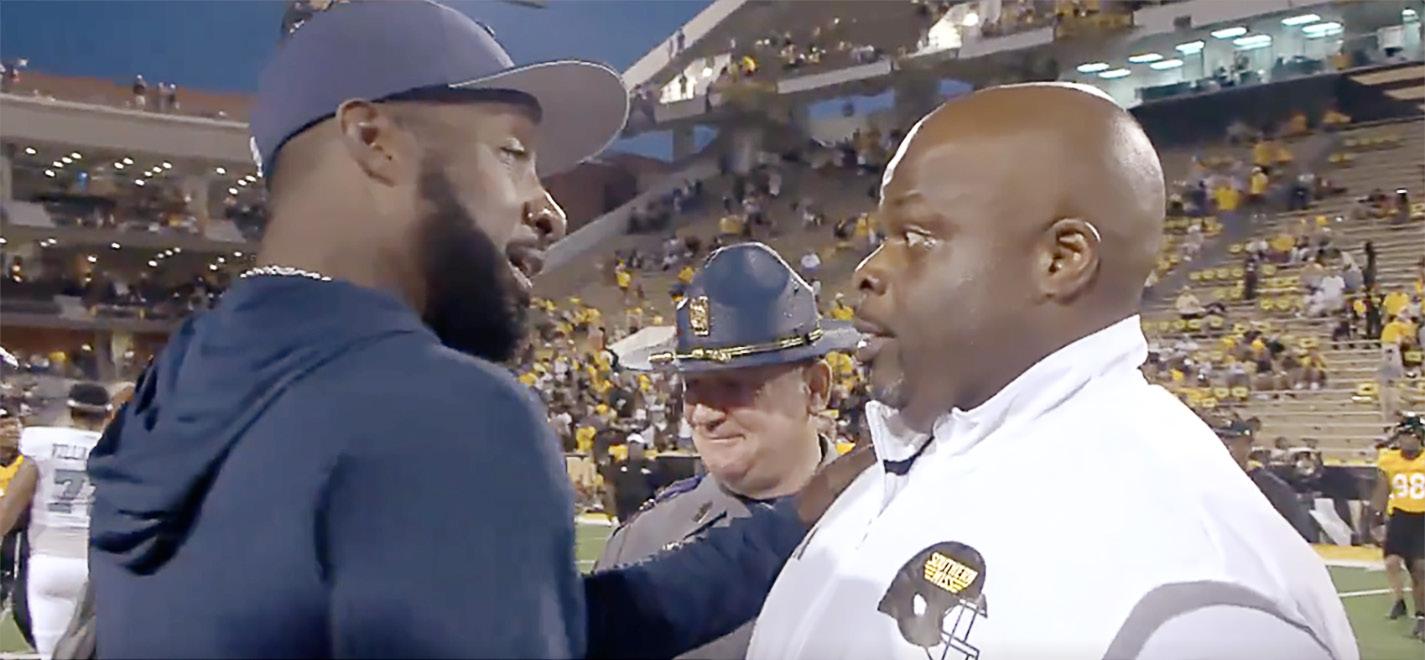
Gameday at The Rock is theater as much as it is sport. The smell of barbecue drifts through the parking lot. Kids in rival jerseys laugh and play together in the yard while music plays loudly and line dances form. It’s Mississippi’s brand of church: ritual, communit and spectacle. Fans travel from Hattiesburg and Jackson, as well as families divided between black and gold and blue and white, to witness a rivalry that has been ongoing on this field since 1987. It’s an exciting feeling that never goes away.
Then the halftime show brought something that the Facebook trolls could never have imagined. Unity.
First, Jackson State’s Sonic Boom of the South faced the crowd. Then, Southern Miss’s Pride of Mississippi swung in, linking the “S” in JSU and USM with their formations. Suddenly, the unanticipated event occurred. They line danced as one to Cupid’s “Flex.”
It gave me chills, a moment I’ll never forget.
For me, this rivalry isn’t theoretical. It’s family. My father, Dillet Montgom-
ery, played basketball at Southern Miss, and my mother, the Rev. Rosa Montgomery-Barron, went there too. My aunt, Phyllis Smiley, graduated from Jackson State. My sister, Delyse, played softball there, and my cousins, Marcus Jr. and Adrian Craft, both played baseball in blue and white. Yes, I’m name-dropping because black and gold run through our blood. Blue and white do, too.
That’s why one ugly Facebook post will never define the fan base for me. I grew up on stories of my father arriving at a racist Southern Miss in the late 1970s, when the campus was hostile ground for Black athletes. By the time I came of age during the Jeff Bower years, the culture of Southern Miss football had already begun to shift. With protests and unrest rising across the country, and Mississippi’s own leadership failing to meet the moment, this was not the time for a racist stunt. Fans come to these games to find joy. The city is proud to host in-state matchups, especially when Mississippi’s HBCUs take the field.
One fan tried to hijack that joy, but the universities refused. Before kickoff, both presidents, Jackson State’s Denise Gregory Jones and Southern Miss’s Joseph S. Paul, released a joint statement affirming unity over division.
The bigger legacy
College football has always been a safe space for me and for so many Mississippians. I love the towns that raised me: Hattiesburg, Petal, Ellisville, Laurel and Jackson. But I don’t love the racism that refuses to die, that insists on showing up uninvited to every gathering, like an uncle who doesn’t know when to leave. That Facebook post was meant to cloud a historic moment. Instead, it threw the spotlight on it.
Coach Huff’s hiring was historic for Southern Miss. He isn’t just another coach climbing the ranks. HBCU culture shaped him. Coach knows he stepped into a position that few Black men ever get to hold.
Huff downplayed the big win after it happened. Instead, he highlighted his friendship with Jackson State’s T.C. Taylor, and discussed putting Mississippi football on the map. But make no mistake: This victory was history. Huff broke Southern Miss’s losing streak, did it against an HBCU, and did it in front of a crowd that looked more like him than the sidelines usually do.
While Brett Favre’s welfare scandal continues to cast a shadow over Southern Miss, Coach Huff is making headlines in a different way. The narrative can change —if we let it. Football, the South’s true religion, has been far too slow to allow Black men into the pulpit. Coach Huff has the potential not only to win games but also to reshape what leadership in Mississippi football means.

By Candace A. Gray TSD Contributing Writer
The Mid-South Minority Business Council Continuum hosted its annual Robert R. Church Sr. Achievement Awards Gala with a spirited gathering of Memphis’ Black business and civic leaders at the Renasant Convention Center on Thursday, Sept. 11. Held in a more intimate setting than in recent years, reflective of the current economic climate, this year’s ceremony saw a smaller crowd, but the sense of community, resilience and excellence was larger than ever.
The evening began at 6 p.m. with networking, laughter and reconnections flowing as guests mingled upon arrival. The bar opened, and DJ Ferg set the tone with an energizing set that was as diverse as Memphis. Unlike in past years, there was no live band, but the energy never dipped. Attendees were dressed to impress, and the atmosphere carried a strong sense of legacy and community uplift.
At 6:30 p.m., dinner was served, and the program began with opening remarks from Jozelle Luster Booker, president and CEO of the MMBCC. She also introduced the award categories for the evening. Her message was one of reflection and pride: a recognition that while the business climate may be challenging, Black businesses in Memphis continue to push boundaries, evolve strategically and anchor communities.
This year’s awards categories included:
• Great Beginnings
• Rising Star
• Economic Engagement
• Operational Excellence and Resilience
• Strategic Growth
• Vanguard Business of the Year
• Advocate of the Year (awarded only when merited)
• Chairman’s Award
• Corporation of the Year
Each award segment included a description of the category, visual and auditory presentations and finalist acknowledgments before the winner of each
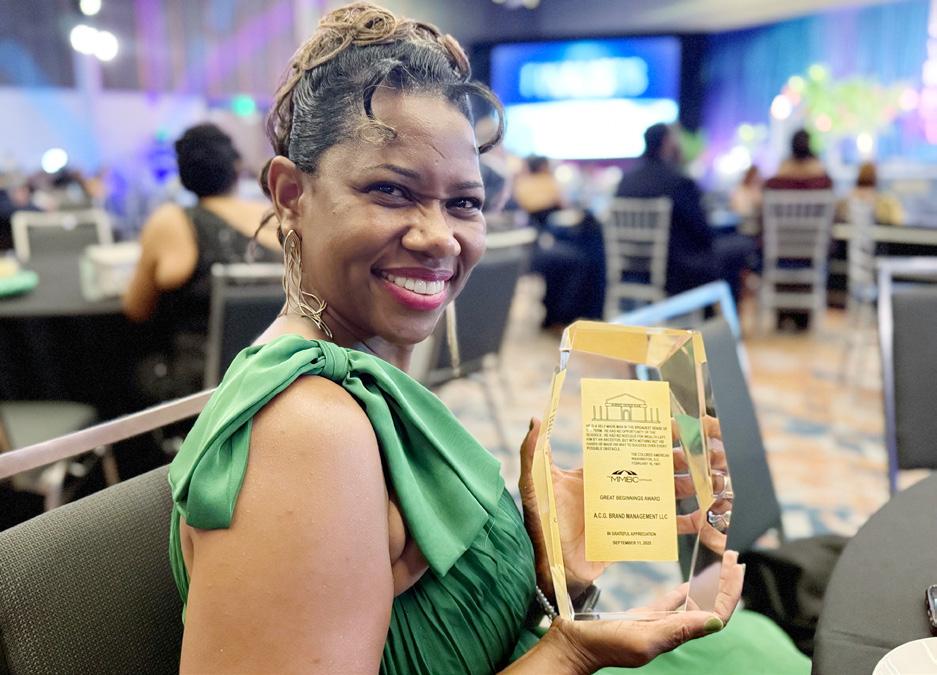
category was announced. Winners were not informed ahead of time, but found out in real time, which added to the excitement of the evening.
The Great Beginnings Award, which honors young businesses entering a new chapter of growth, was awarded to Alicia R. Hill of ACG Brand Management. Her innovation and vision set her apart from fellow finalists Dear Lakesha and Memphis Shelby County Schools.
The Rising Star Award went to Eileen Peterson of Turner Construction, recognized for her excellence within her first five years in her role. She stood alongside finalists Brent Hooks and Yumeika Lucas-Myers, both of whom exemplify mission-driven leadership. Systems Technologies took home the Economic Engagement Award, honoring organizations that create opportunities for small businesses through impactful and inclusive supplier partnerships. Other finalists included TopCat Masonry Contractors and W&T Contracting.
In the category of Operational Excellence and Resilience, Campbell & Ford Construction was honored for its embrace of automation and innovation. Its work was recognized among Stragistics Technology
Inc. and TopCat Masonry Contractors.
Strategic Growth, which celebrates businesses scaling with foresight and discipline, was awarded to W&T Contracting Corporation. They were selected over finalists Memphis Electric Company LLC and Campbell & Ford Construction.
The Vanguard Business of the Year Award, which honors major contributions to economic development, went to Pete Mitchell & Associates, standing out among nominees Action Janitorial Paper Safety and W&T Contracting.
Two special honors were awarded based on extraordinary performance and commitment:
• Khalid Johnson of Turner Construction was named Advocate of the Year, recognized for his unwavering support of MMBCC’s mission and community advancement.
• The Chairman’s Award went to Turner Construction as well, highlighting the company’s long-term dedication to championing small business innovation and growth.
The evening’s highest honor, Corporation of the Year, was presented to MLGW (Memphis Light, Gas & Water), acknowledging the utility’s significant and sustained economic impact in the region. Other finalists included Grinder Taber Grinder (GTG) and Turner Construction, demonstrating the competitive nature of this prestigious award.
The program ended after about an hour, but the night didn’t conclude there. Guests remained to enjoy light dancing and conversation, closing the evening on a celebratory and optimistic note.
The event was made possible with support from sponsors including W&T Contracting and Tennessee Valley Authority (TVA), whose investment underscores the importance of empowering business owners of color in Memphis.
Though smaller in scale than years past, the 2025 MMBC Continuum Robert R. Church Sr. Achievement Awards proved that impact isn’t measured by numbers alone. It’s about people — the visionaries, advocates and community builders — who are shaping a better Memphis every day.